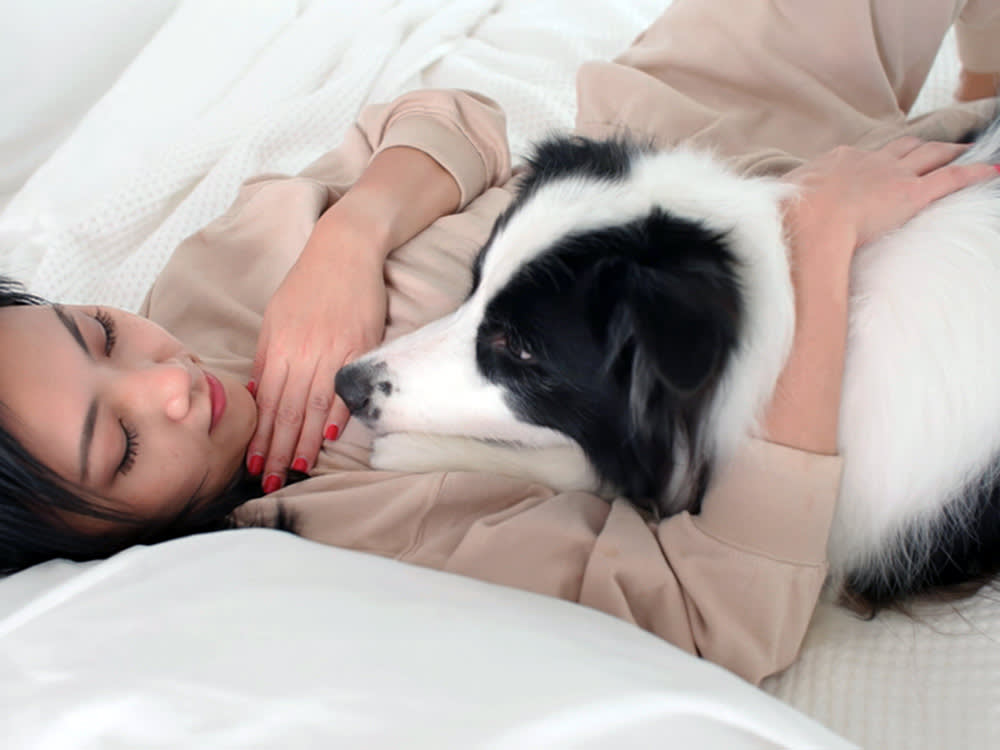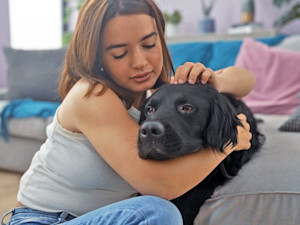The Best Home Remedies for Your Dog’s Cough
Here's what you need to get rid of that cough.

Share Article
In This Article:
What is Kennel Cough in Dogs? What Are Natural Cough Home Remedies? The Best Home Remedies for Your Dog’s Cough When to See a Vet for Your Dog’s Cough
If you hear your dog cough, it can immediately cause concern. If it happens again, you may start wondering what is causing your dog to cough and whether you should contact the vet.
Fortunately, not every cough requires a veterinarian appointment. There are many different causes of coughing and different levels of seriousness. A pet parent needs to know these causes of coughing and how to assess the severity. Also, since some cases of coughing indicate very mild illness and you don’t need a vet, you need to know what you can do at home to make your dog feel better.
This guide examines natural remedies, offers insights into kennel cough and other causes of canine coughing, and helps you know when to seek vet care.
Main takeaways
Kennel cough is a contagious respiratory illness in dogs.
There are specific symptoms of kennel cough, including a characteristic cough.
The cause of kennel cough is contact with a sick dog or shared bowls, toys, or bedding.
There are several things you can do for your dog at home.
See your vet if home remedies aren’t helping and your dog is getting worse.

What is kennel cough in dogs?
Kennel cough is a contagious respiratory illness caused by bacteria and viruses that dogs acquire from other dogs in shelters, dog parks, and boarding facilities. The one we hear about most often is bordetella bronchiseptica, although kennel cough can also be caused by canine parainfluenza virus and others. The condition is usually not life-threatening, but it can make your dog very uncomfortable and, in rare instances, become serious if not treated.
Kennel cough symptoms
The most common symptoms of kennel cough include:
A persistent, dry, hacking cough that resembles a honking sound; this is the trademark symptom.
Gagging or retching often follows coughing fits as though your dog is trying to clear the throat.
Nasal discharge or mild sneezing are typical signs of upper respiratory disease.
Anorexia or lethargy is seen in severe cases.
Symptoms may worsen with activities that strain the respiratory system, such as exercise or excitement.
Kennel cough symptoms last one to three weeks in mild cases. Your vet should examine your dog for secondary infections or complications if they last longer.
Kennel cough causes
Kennel cough is primarily spread through:
Direct contact with other dogs who are sick by sniffing, licking, or playing together
Sharing water bowls, bedding, or toys
If your dog is in a crowded or poorly ventilated space, the bacteria can be spread through airborne respiratory droplets. Examples include dog parks, boarding kennels, doggy day care centers, and shelters.
Dogs with an immunocompromised system can be more susceptible to kennel cough and other respiratory infections. Stress, poor nutrition, and other health issues can affect the immune system.
What are natural cough home remedies?
There is no cure for kennel cough, and it often resolves on its own. However, home remedies that are non-prescription, gentle, natural, and easy to administer can make your dog feel better by soothing the throat, reducing inflammation, and supporting the immune system.
The best home remedies for your dog’s cough
The following are steps to make your dog feel better, as well as natural medicines you can give to help that irritated throat and suppress the cough that’s keeping you both awake at night.
Steam or humidification
The most simple thing you can do is actually very helpful. Steam or humidification can be an effective way to relieve your dog’s cough. Have your dog sit in the bathroom while a hot shower lasts 10 to 15 minutes. The warm, moist air:
soothes irritated airways
loosens mucus
reduces coughing caused by dryness or irritation
A humidifier in your dog’s sleeping area can help a great deal. It will maintain moist air, which is especially helpful during the winter. Have your dog nap in that area at least once or twice daily.
Honey
There’s a good reason why honey is an ingredient in most human cough drops: drinking tea with honey helps your throat. Honey is a natural cough suppressant and soothing agent for irritated throats. Its antimicrobial properties can ease coughing fits. Here’s how to use honey:
Give one teaspoon to small dogs and up to one tablespoon to larger dogs, two to three times a day.
Use raw, unprocessed honey for maximum benefits.
Avoid giving honey to puppies under one year of age due to the risk of botulism.
Most dogs will lick honey right off the spoon, but you can mix honey with warm water, too. You can also use herbal teas safe for dogs (one is chamomile). This can enhance the honey’s soothing effect and provide extra relief.
Manuka honey, imported from New Zealand, is the most recommended type of honey. Honey can also be mixed with coconut oil, which contains fatty acids. The recommended dosage of coconut oil is one teaspoon per 10 pounds of body weight divided over the day.
Rest
Just as in humans, rest can be one of the most helpful things to do when you’re ill, which is valid for your dog. You may wonder how you get your dog to rest. Here are some suggestions:
Avoiding walks or playtime
Providing a quiet, comfortable space free from noise or disruptions
Encouraging relaxation with calming activities or soft bedding
Keep your dog’s environment stress-free, as stress can weaken their immune system and prolong recovery.
Getting plenty of fluids
Staying well-hydrated is critical to all your dog’s illnesses and health. Be sure to give your dog fresh water constantly. Refresh it several times daily if that helps entice your dog to drink. If your dog is reluctant to drink, try the following:
Add low-sodium chicken broth to your dog’s water bowl.
Offer ice cubes to your dog; some really like them and find them fun to lick. Hydration not only soothes the throat but also helps thin mucus.
Pedialyte is a controversial topic. Most veterinarians will recommend you not give it to your dog.
Chicken broth
A little more about chicken broth: warm, low-sodium chicken broth is comforting and nutritious. It helps in the following ways:
Keeps your dog hydrated
Provides warmth to soothe the throat
Offers additional nutrients to support recovery
You can easily make your own chicken broth. Boil chicken without added salt or seasonings. After cooking, strain the broth to remove any tiny bones or fat. Serve it to your dog while it’s warm but not too hot.
Vitamin C and immune support
Vitamin C is something people often turn to when they have a cold or other illness. It can boost your immune system and help fight off infections. It can do this for your dog, too. Here’s the best way to get more vitamin C into your dog:
Add blueberries or oranges to your dog’s diet (in moderation).
Use vet-approved immune-support supplements, such as echinacea or probiotics.
Feed your dog a balanced, high-quality diet.
Don’t add any supplements without approval from your vet.
Using a harness
Use a harness if anything (not just kennel cough but any respiratory issue or tracheal collapse) happens with your dog’s throat. It won’t press on your dog’s throat like a collar does. Collars can:
Put pressure on the throat, worsening coughing.
Trigger coughing fits, especially in small or brachycephalic breeds.
A well-fitted harness allows you to take easy, short walks with your pooch without increasing your dog’s symptoms. Look for a harness designed for comfort and avoid pulling on the leash during walks.
Avoiding smoke and other irritants
We’re sure you know what it’s like to be around smoke, strong perfumes, or cleaning chemicals. Even if you’re not sick, it can be really irritating and even make you cough and sneeze. Well, the same is true for your dog. To reduce exposure:
Avoid smoking near your dog.
Use pet-safe cleaning products.
Keep your home well-ventilated to minimize airborne irritants.
If your dog also has allergies, an air purifier and hypoallergenic bedding can help.
Natural cough suppressants
Some natural remedies can act as mild cough suppressants and throat soothers. These include slippery elm and licorice root. These are available as:
Teas: Brew slippery elm or licorice root tea and let it cool before offering it to your dog.
Powders: Mix a small amount of powder into your dog’s food or water.
Caution: Always consult your veterinarian before using herbal remedies to ensure they are safe for your pet’s condition.
If you use any of the above, you can still use honey for enhanced soothing effects.
When to see a vet for your dog’s cough
Kennel cough and other coughing conditions often resolve with home care and a little time. However, there are additional conditions that can make it necessary to see a vet:
Duration: The cough lasts for over a week and has no improvement.
Severity: Difficulty breathing, wheezing, or bluish gums
Accompanying symptoms: Fever, lethargy, vomiting, or loss of appetite
Underlying conditions: Your dog has a history of heart disease, respiratory conditions, or tracheal collapse.
Cough characteristics: If you see blood or mucus or the cough is getting worse over time
If any of the above occurs, see your veterinarian right away. They can perform X-rays, blood tests, or endoscopy to ensure they know of any underlying causes. Once they diagnose the cause, they can provide the proper treatment, such as antibiotics, anti-inflammatory medications, or specialized therapies. Combining natural remedies with timely veterinary care ensures your dog remains happy and healthy, ready to enjoy life without discomfort.
References
“The Coughing Dog.” Veterinary Teaching Hospital, 2021, hospital.vetmed.wsu.edu/2021/06/19/the-coughing-dog/opens in new tab

Dr. Shelby Neely, DVM
Dr. Shelby Neely is a freelance writer and veterinarian who graduated from the University of Pennsylvania School of Veterinary Medicine and has practiced veterinary medicine for 30 years, specializing in small animals. Her work has appeared in Allivet, AsktheCatDoctor, WhiskerDocs, Ask the Cat Doctor Radio, Ask the Cat Doctor TV, and numerous other websites, brochures, newsletters, newspapers, and ebooks. In her spare time, Dr. Neely likes to spend time with her three children, two grandchildren, three cats, two grand-cats, and five grand-dogs.
Related articles
![Woman cuddling her sick black dog at home.]()
Diagnosing Kennel Cough in Dogs: A Comprehensive Guide
When to call the vet.
![A dog outside with his mouth open coughing]()
Respiratory Illnesses in Dogs: 6 Serious Conditions Related to Coughing in Dogs
Vet advice on when you should be worried.
![A dog coughing]()
Is Kennel Cough Contagious?
What you need to know about this super contagious disease. (Hint: There’s a vaccine.)
What to Do If You Think Your Puppy Has Kennel Cough
Symptoms to look out for.
Can My Dog Eat Honey? Learn If Honey Is Beneficial or Harmful For Dogs
They shouldn’t exactly have their paw constantly in the honey jar, but the sweet stuff can be beneficial in some cases.






